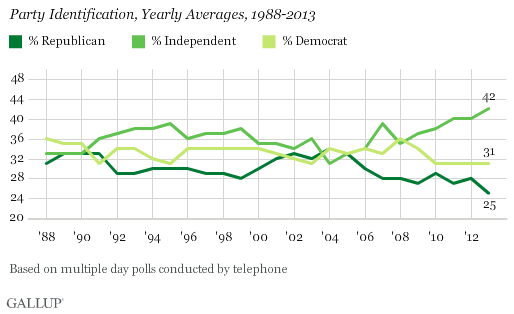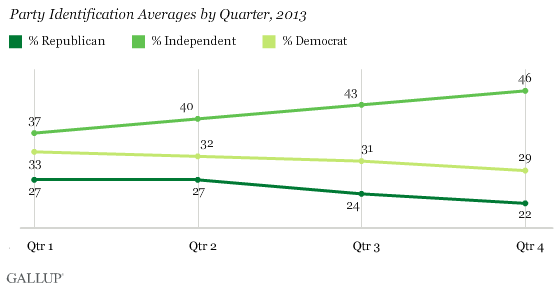Percentage of Independents Reaches Yet Another Record High
Since 1988, Gallup has been asking Americans how they self-identify: as Democrats, as Republicans, or as independents? The trend lines are unmistakable:

And just like last January, the polling organization's results for the prior year show a record percentage going indy:
Forty-two percent of Americans, on average, identified as political independents in 2013, the highest Gallup has measured since it began conducting interviews by telephone 25 years ago. Meanwhile, Republican identification fell to 25%, the lowest over that time span. At 31%, Democratic identification is unchanged from the last four years but down from 36% in 2008.
These results are bad news for the party of Barack Obama….
The current 31% of Americans identifying as Democrats matches the lowest annual average in the last 25 years.
….And they are bad news for Republicans, who—amazingly—have failed to gain while the rest of America continues to lose under the Democratic president:
When [George W. Bush] left office, Republican identification was down to 28%. It has declined or stagnated since then, improving only slightly to 29% in 2010, the year Republicans "shellacked" Democrats in the midterm elections.
Not only are the trend lines clear over the past quarter century, they're clear over the past 12 months:

As the Gallup write-up points out,
The 46% independent identification in the fourth quarter is a full three percentage points higher than Gallup has measured in any quarter during its telephone polling era.
Those commentators who still self-identify with one of the two dwindling major tribes will surely contend that a 42 percent independents number will not soon translate into anything like a 42 percent vote for a third party, nor does it mean there's a 42 percent bloc of centrists, or libertarians, or any other monolithic grouping of jackalopes. All of which is true.
But as Nick Gillespie and I argue in The Declaration of Independents: How Libertarian Politics Can Fix What's Wrong With America (a distillation of which you can read in the August 2011 issue of Reason), the economy/society-wide loss of brand loyalty and gain of individualized, tech-fueled disruption will hit politics and especially governance last, because of government's guaranteed revenue streams and party-rigged insulation from competition. But just because it will happen last, doesn't mean it isn't already beginning to happen. Here's a bit from that magazine excerpt, all of 29 months ago:
Where will the next political smart mob, the next online swarm, come from? Look wherever there is too broad a gap between the two major political parties and their bases. One good short-term bet is the issue of rolling back the drug war, which professional Democrats from the president on down openly mock while a growing number of Republicans (such as presidential candidates Ron Paul and Gary Johnson) gain surprising support by uttering the unspeakable.
Looking pretty prescient now, right?
Gallup routinely finds fed-up voters leaning increasingly libertarian on a whole host of issues. Even non-libertarians like Charles Krauthammer express something like awe at how quickly libertarian impulses—particularly those that professional politicians have long blunted—are gaining the upper hand. Voters who act like free agents are inherently difficult to herd, and are capable of producing sudden, dynamic change. As Gallup muses:
The increased independence adds a greater level of unpredictability to this year's congressional midterm elections. Because U.S. voters are less anchored to the parties than ever before, it's not clear what kind of appeals may be most effective to winning votes. But with Americans increasingly eschewing party labels for themselves, candidates who are less closely aligned to their party or its prevailing doctrine may benefit.
Expect some discussion on this topic on tonight's episode of The Independents.


Show Comments (37)